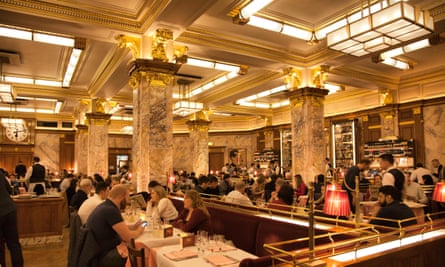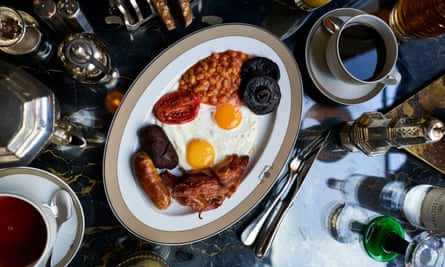Shortly after 4pm last Friday, dozens of staff at Brasserie Zédel, close by London’s Piccadilly Circus, gathered in the Crazy Coqs, the glorious art deco cabaret room opposite the restaurant. There, they were addressed by Dillip Rajakarier, CEO of Minor International. Overnight, the vast Thai hotel and restaurant group had won a bidding war to take control of Zédel’s parent company, which also owns landmark London restaurants including the Wolseley, Delaunay and Colbert. He was now the boss.
“He got it wrong from the start,” says one person who was present. “He kept referring to us as a brand. We’ve never thought of ourselves as a brand.” The meeting became increasingly fractious. “He told us that founders come and go,” says another. “That was when he completely lost us.” Similar town hall meetings planned for the other restaurants were swiftly cancelled. It seemed that Rajakarier had underestimated the loyalty of the staff to those founders, Chris Corbin and Jeremy King.
While Corbin had taken a step back in recent years, King, regarded by many in the hospitality business as the capital’s leading restaurateur, remained very much hands on. He’s famed for his eye for detail and for his daily tours of his restaurant dining rooms, for stopping by the tables of regulars and newcomers alike to check they were being looked after. The difference between a restaurant owner and a restaurateur, he said once, is that one runs it from the boardroom and one runs it from the floor. King was always on the floor. Now he was out, banned from even entering any of the nine restaurants he had created.

It was the dismal end to a fractious battle which began in 2017, when Corbin and King sold a majority shareholding in the business to Minor International to fund expansion. Commercial disagreements led Minor to force the company into administration, even though all the restaurants were trading profitably. In the early hours of Friday morning, the administrators held an auction during which King, backed by American investors, attempted to buy back his company. But Minor won, purchasing the remaining 24% of Corbin & King for a sum reportedly north of £60m. “I no longer have any equity in the business,” King told colleagues in a subsequent email.
That morning every one of the restaurants posted a monochrome image of the two founders to their individual Instagram accounts with the caption: “THIS is Corbin & King.” Leading figures in the restaurant business expressed their dismay across social media. Stephen Fry tweeted: “Oh bollocks. Is it always going to be a world where the good guys lose and the greedy, soulless and mean win out?”
In the midst of a cost of living crisis, when energy prices are going through the roof, a boardroom battle over a bunch of apparently fancy restaurants, with menus full of steak tartare and îles flottantes, may seem less than important. But what has happened to the much-loved group led by the Wolseley, on London’s Piccadilly, speaks to a faceless corporatisation of hospitality which has little to do with being hospitable and everything to do with profit above all else.
Corbin and King met in the late 1970s when they were respectively running front of house at London brasseries Langan’s and Joe Allen. Together they bought the Caprice and turned it into a sure-fire hit, with a starry clientele. It became the cornerstone of an empire famed for its service, which included The Ivy. Since they sold that group in the late 1990s, it has gone through various owners and is now in the hands of businessman Richard Caring. In a foreshadowing of last week’s events, he has turned The Ivy name into a grim brand, shedding the talented staff who made the original restaurant what it was and cutting costs.
But at least there was still the Wolseley, which Corbin & King opened in 2003. It was a Mittel European style restaurant with a menu of high-class comfort food, famed not just for its wiener schnitzel or Viennese cakes but also for the way it made customers feel. The artist Lucian Freud went so often that when he died they laid his regular corner table with a black tablecloth and left it clear all night.

Then came the Delaunay, a favourite of actors including Eileen Atkins and Derek Jacobi, followed by Zédel, a vast gilded homage to the great Parisian brasseries, with its menu priced for the masses. At opening the soup de jour was just £2.25. Here, I should declare an interest: my jazz ensemble has had a monthly residency at Zédel for years. Hence I’ve become a freelance employee. I have learned that, while the company may have around 1,000 staff, they genuinely regard themselves as a kind of family led by King. He has promoted enlightened recruitment policies, including flexible working hours for parents of young children and an emphasis on older staff.
On Friday evening the Wolseley’s tables were full, the great vaulted dining room clattering with chatter. The always-reliable food was flying out of the kitchens. My wiener Holstein, a schnitzel with capers and anchovies, was on point. The staff on the floor were doing their job as impeccably as ever. But quietly they admitted it had been a traumatic day. “I’ve given a quarter of my life to this company,” said one. “But I don’t think it’s going to be the same place any more.”
As for Jeremy King, when the crisis first unfolded in January, he told one journalist that he enjoys the business too much: “And I’m too young to retire.”
The future of the restaurants he opened may be unclear, but it’s certain King will be back.
